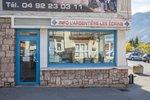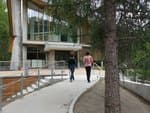Les Eyssuches (no. 18)
Description
The circuit starts right in the centre of town, not far from the bridge spanning the Durance. In fact, you need to cross this bridge to get to the main road
- When you reach the main road, go straight across and up to the cemetery. Skirt around the cemetery on the north side, following a forest track
- Where the tracks intersect, continue due south on the forest track
- At the next intersection, go past the tank on your left and continue downhill on the track, heading due south
- Leave the track, turning left onto a narrow path which runs through the forest and drops down to La Roche-de-Rame
- After the chapel of Saint Roch de Géro, cross the mountain stream and take the narrow road on your right
- Upstream from the main road, turn left into the bridge underpass
- Carry on due south past the old waste collection site
- At the bridge (Pont de Traverses), rejoin the road on the right-hand bank of the Durance and this brings you back to Plan Léothaud
- Go right under the railway line and then left towards the leisure centre ("Base de loisirs")
- You then rejoin the green route ("Voie Verte") and this brings you back to the starting point of the circuit
- Departure : Place du kiosque, L’Argentière-la-Bessée
- Arrival : Place du kiosque, L’Argentière-la-Bessée
- Towns crossed : L'Argentière-la-Bessée, La Roche-de-Rame, Freissinières, and Champcella
Altimetric profile
Recommandations
>Rescue services contact details: Secours Montagne (Mountain Rescue): +33 (0)4 92 22 22 22 or 112
Take your litter home
Do not take shortcuts across pasturelandInformation desks
23 Avenue de la République, 05120 L'Argentière-La Bessée
Vallouise Park house
, 05290 Vallouise
Information, documentation, models, exhibitions, screenings, product sales and works of the Park. Guided tours for school, reservation required. The new Park House opened in Vallouise since June 1, and offers visitors an interactive permanent exhibition inviting to explore the area and its heritage. A temporary exhibition space will allow a renewed offer. Finally, the device is completed by an audiovisual room to organize screenings and conferences Free admission. All animations of the Park are free unless otherwise stated.
Transport
Public transports >> www.pacamobilite.fr
Consider car-sharing >> www.blablacar.fr
Access and parking
Parking :
Sensitive areas
Short-toed snake eagle
- Impacted practices:
- Aerial,
- Sensitivity periods:
- MarAprMayJunJulAugSep
- Contact:
- Parc National des Écrins
Julien Charron
julien.charron@ecrins-parcnational.fr
Short-toed snake eagle
- Impacted practices:
- Aerial,
- Sensitivity periods:
- MarAprMayJunJulAugSep
- Contact:
- Parc National des Écrins
Julien Charron
julien.charron@ecrins-parcnational.fr
Short-toed snake eagle
- Impacted practices:
- Aerial,
- Sensitivity periods:
- MarAprMayJunJulAugSep
- Contact:
- Parc National des Écrins
Julien Charron
julien.charron@ecrins-parcnational.fr
Short-toed snake eagle
- Impacted practices:
- Aerial,
- Sensitivity periods:
- MarAprMayJunJulAugSep
- Contact:
- Parc National des Écrins
Julien Charron
julien.charron@ecrins-parcnational.fr
6 points of interest
 History
HistoryThe penstock pipe
It was in the late nineteenth and early twentieth century that hydropower really came into its own in L'Argentière-la-Bessée. There was plenty of water flowing from the mountains here to generate electricity, at a time when electricity transmission - let alone diversion - technology had not yet been developed. This was achieved by digging out a number of tunnels and laying penstock pipes. Aluminium production became possible and so, too, did a fused quartz activity, making specialised glass for the chemicals industry.
 Fauna
FaunaThe southern swallowtail
This very beautiful but rare butterfly is similar to - and can easily be mistaken for - other more common butterflies, the scarce swallowtail (common despite its name) and the common yellow swallowtail. It lives on hot, limestone hillsides. Although protected, it is threatened by the disappearance of its habitat, due in particular to urbanisation and its capture and trade (both illegal) for collectors. Vernacular heritage
Vernacular heritageLa Roche-de-Rame
The municipality of La Roche-de-Rame lies entirely on the left-hand bank of the Durance. Like L'Argentière-la-Bessée, its recent history has been profoundly marked by industry which saw rapid expansion in the early twentieth century. Well known for its natural stretch of water, a glacial lake, the hamlets of the municipality are dotted across the slopes. Fauna
FaunaThe black kite
A bird of prey circles slowly above the valley. It is dark coloured with a slightly forked tail. A black kite, which returned from Africa in spring. It feeds on carrion or scraps as well as fish. It is easy to confuse with the red kite which is brown, red and white and its tail has a much more pronounced fork. The red kite does not nest here in the massif. It is only seen during the migration period, in the Durance valley.
 Water
WaterThe white water stadium
As part of its restructuring after the closure of the industrial site, the town of L'Argentière-la-Bessée opted for sports tourism, exploiting the natural elements present on the site, that is to say, water. Standing at the beginning of the longest navigable section of the Durance river, in 1993 the municipality decided to establish itself as a major white water centre by creating this stadium which covers a 400-metre stretch. So thanks to its reputation and its ideal situation, every year this stadium hosts several elite competitions at national and international level. History
HistoryFormer industrial area of L’Argentière-la-Bessée
On the two walls of these now-disused industrial structures, you can read the history of L’Argentière-la-Bessée. The town is marked by its industrial past, in particular by the presence of a hydroelectric power station built between 1907 and 1909 to harness the power of the mountain waterfalls. At the time, it was the most powerful power station in Europe. Other industries were also established here, like the Société du Quartz Fondu fused quartz works and the aluminium factory which provided livelihoods for a large number of workers.
Source

Report a problem or an error
If you have found an error on this page or if you have noticed any problems during your hike, please report them to us here:


